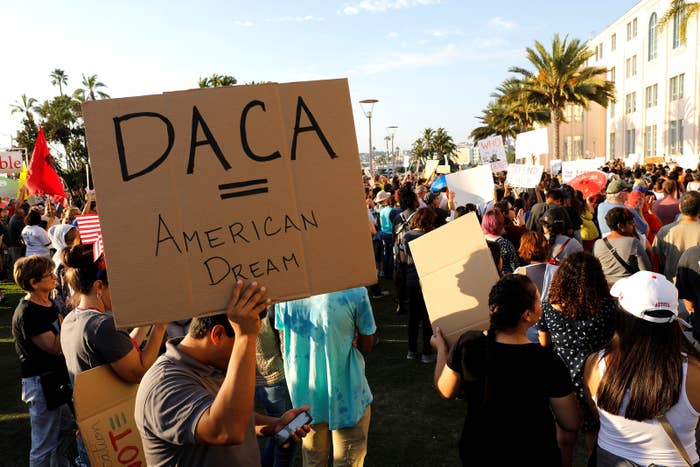
The US Department of Justice announced Tuesday that it will take the unusual step of immediately petitioning the US Supreme Court to challenge a judge's order that partially revived the Deferred Action for Childhood Arrival program.
An appeal would normally go to a federal circuit court — in this case, the US Court of Appeals for the 9th Circuit — before either side attempted to take it to the Supreme Court. But Attorney General Jeff Sessions said in a statement that the government would petition the high court now, in addition to appealing to the 9th Circuit, in the hopes of getting a faster resolution.
"We are now taking the rare step of requesting direct review on the merits of this injunction by the Supreme Court so that this issue may be resolved quickly and fairly for all the parties involved," Sessions said.
The DACA program provided temporary protection against deportation for undocumented immigrants brought to the United States as children. Nearly 800,000 people had received benefits through the program before the Trump administration announced in September that it would end it.
A federal district judge in San Francisco issued an order on Jan. 9 that partially revived DACA while legal challenges against the decision to end it went forward. US District Judge William Alsup ruled that the Trump administration must resume accepting renewal applications from people who had already been enrolled in the program. The judge found that groups and individuals challenging President Donald Trump's decision to end DACA were likely to succeed in their claim that the move was "arbitrary and capricious."
Alsup did not order the administration to accept new applications.
Following Alsup's ruling, the US Department of Homeland Security announced that it would follow the order and accept renewal applications, including from past recipients whose deferred action status had expired after the administration stopped accepting renewals last year. The administration announced on Sept. 5 that it would wind down the program — no new applications would be accepted, and renewals would only be accepted through Oct. 5 from recipients whose benefits were set to expire by March 5, 2018.
The Justice Department's appeal comes as Democrats, Republicans, and the White House have been attempting to negotiate a deal that would address the status of undocumented immigrants who were eligible for protection against deportation under the DACA program. But those efforts were derailed after Trump knocked down a bipartisan agreement and reports came out that Trump had referred to certain countries as "shithole" places during an Oval Office meeting with lawmakers about immigration.
Republicans and Democrats have also disagreed about the timing of a deal — a government shutdown is looming if lawmakers fail to approve a spending measure by the end of the week — and the scope. Trump on Jan. 14 tweeted that DACA "is probably dead," accusing Democrats of trying to stop US military spending.
Mark Rosenbaum, one of the lawyers representing individual DACA recipients that filed one of the lawsuits against the Trump administration, told BuzzFeed News that the Justice Department's decision to challenge Alsup's order is "deeply disappointing." That DOJ would attempt to go directly to the Supreme Court was "more evidence that the usual rules by which a democracy functions aren't being followed here," he said.
"DACA recipients don't represent any threat to the national security or the well-being of this country. The authority for that is the United States government, who has thoroughly vetted each and every one of these recipients," said Rosenbaum, director of legal advocacy group Public Counsel, which is representing DACA recipients with the law firm Gibson, Dunn & Crutcher. He said that DACA recipients were unfairly being used as a "bargaining chip" in the political negotiations over immigration.
UPDATE
Updated with comment from Mark Rosenbaum.

